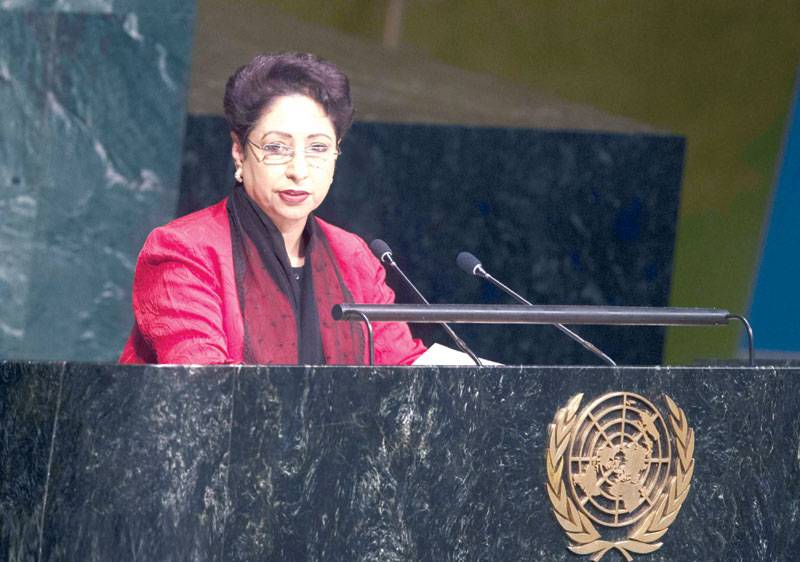UNITED NATIONS - Reaffirming its commitment to defeat terrorism and violent extremism, Pakistan has called for evolving a clear understanding of the nature and dimensions of the scourge alongwith efforts to address underlying causes of the scourge so as to formulate narratives as well as strategies and responses.
“Conditions conducive to the spread of different forms of violent extremism include, inter alia, festering, unresolved conflicts, socio-economic marginalisation and exclusion, a sense of deprivation and injustice, real or imagined, lack of social stability, intolerance as well as religious, racial and ethnic discrimination, bigotry and hatred,” Ambassador Maleeha Lodhi told the General Assembly.
In addition,Maleeha Lodhi pointed out that lack of a clear distinction between free speech and hate speech has provided space for extremists to promote their twisted ideology and agenda.
“The rise of Islamophobia in the West has further fuelled extremist thinking,” Ambassador Maleeha Lodhi told the 193-member Assembly. The Pakistani envoy was participating in a high-level meeting on Promoting Tolerance and Reconciliation, Fostering Peaceful, Inclusive Societies and Countering Violent Extremism.
General Assembly President Sam Kutesa, who opened the discussion, called on the international community to work against intolerance at a critical time when “conditions conducive to the spread of different forms of violent extremism include, inter alia, festering, unresolved conflicts, socio-economic marginalisation and exclusion, a sense of deprivation and injustice, real or imagined, lack of social stability, intolerance as well as religious, racial and ethnic discrimination, bigotry and hatred.”
In her remarks,Maleeha Lodhi said, “violent extremism poses one of the world’s most imposing challenges today. It affects us all; as States and societies.”
Building resilience in communities and societies was essential for mobilising their support and trust to evolve a successful strategy to counter violent extremism, she said. Education and educational programmes must be nationally owned and led, the Pakistani envoy said.
“Curriculum lies at the heart of educational efforts and should, therefore, focus on promoting tolerance, harmony, and reconciliation, she said, adding, that understanding among civilisations and respect for other faiths should be inculcated from the very start.” Emphasising the role of religious leaders, she said that they can help to counter and de-legitimise acts of violence, regardless of justifications or motivations. “Our religious leaders and scholars have issued fatwas – religious edicts – to counter extremist ideology and actions.”
In this regard, she also emphasised promotion of inter-faith harmony to counter extremist narratives, correct common stereotypes and promote tolerance.
“In what must be a multi-stakeholder enterprise, political and faith leaders, the media and civil society, women and the young, all have a role to play.”
As part of its National Action Plan to Counter Terrorism, Pakistan had adopted a comprehensive strategy that involves a crackdown on hate speech and material, steps against religious persecution, regulation of religious schools or madrassas, preventing the misuse of places of worship and measures against the use of social media for terrorism or its glorification, she told delegates from around the world.
Recognizing the need to focus on youth, she said that Prime Minister Nawaz Sharif had launched a Special Programme that focuses on offering economic opportunities to them. At the UN, Pakistan presents the General Assembly resolution on the promotion of Interreligious and Intercultural Dialogue; and at the Human Rights Council in Geneva, Pakistan coordinates and leads the OIC Group position on a resolution on combating intolerance, discrimination and violence on the basis of religion or belief.
“These initiatives at the national and international level are emblematic of Pakistan’s unequivocal commitment to defeat violent extremism and promote a culture of dialogue, understanding and cooperation between all religions and civilisations of the world,” she said.
In conclusion, the Pakistani envoy said, “While we may belong to different faiths and cultures, we have a shared destiny that unites us in our common endeavour to build a culture of peace and harmony.”
Addressing a Press conference at the conclusion of the debate on Thursday, General Assembly President Kutesa called for the defeat of obscurantism and urged faith leaders around the world to denounce those who preach intolerance in the name of religion. “From Paris to Tunis; from Garissa to Yarmouk; from Johannesburg to Peshawar; no person, society or nation is immune from intolerance or violent extremism,” Kutesa said. “There is no justification for such attacks. Collectively, we must condemn all manifestations of intolerance but also take action to present and stop them.” The historic high-level event – which concluded on Thursday and which was convened by Mr Kutesa in conjunction with Secretary-General Ban Ki-moon and the UN High Representative for the Alliance of Civilisations, Nassir Abdulaziz Al-Nasser – brought together leaders representing diverse faiths, including Islam, Judaism, Christianity, as well as Ministers, academics, and spiritual teachers, in an effort to address the root causes of extremism committed in the name of religion.
Aside from underlining the critical role played by faith leaders in speaking out against radicalism, Kutesa also highlighted the importance of media in the global debate on intolerance, noting that it was used both as a recruitment tool for terrorist organisations as well as a positive means for engaging and educating citizens.
Friday, April 19, 2024
Pakistan vows to uproot terrorism, extremism

Pak economy improving, funds will be provided on request: IMF
9:57 PM | April 19, 2024
Minister advocates for IT growth with public-private collaboration
9:57 PM | April 19, 2024
Judges' letter: IHC seeks suggestions from all judges
9:55 PM | April 19, 2024
Formula 1 returns to China for Round 5
9:05 PM | April 19, 2024
Germany head coach Julian Nagelsmann extends contract till 2026 World Cup
9:00 PM | April 19, 2024
A Tense Neighbourhood
April 19, 2024
Dubai Underwater
April 19, 2024
X Debate Continues
April 19, 2024
Hepatitis Challenge
April 18, 2024
IMF Predictions
April 18, 2024
Kite tragedy
April 19, 2024
Discipline dilemma
April 19, 2024
Urgent plea
April 19, 2024
Justice denied
April 18, 2024
AI dilemmas unveiled
April 18, 2024
ePaper - Nawaiwaqt
Advertisement
Nawaiwaqt Group | Copyright © 2024





